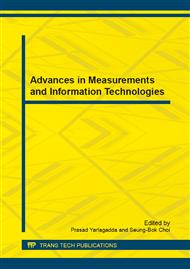[1]
H. Kitano, M. Asada, and Y. Kuniyoshi, et al. RoboCup: the robot world cup initiative Proceedings of the International Conference on Autonomous Agents Marina del Rey, CA, and USA: ACM, New York, NY, USA, 1997, 340-347.
DOI: 10.1145/267658.267738
Google Scholar
[2]
Lin Liu. Research on multi-robot system task allocation and formation control [D]. Changsha: National university of defense technology, 2006. 9. (in Chinese).
Google Scholar
[3]
Graham Romp, Translation of Game theory introduction and application [M], Translated by Ke Huaqing, Yan Jingyi in chinese, Beijing: China university of political science and law press, 2005. 11.
Google Scholar
[4]
C. Boutilier. Planning, learning and coordination in Multi-agent decision processes. In Proceedings of the Conference on Theoretical Aspects of Rationality and Knowledge, 1996: 195-210.
Google Scholar
[5]
M. Bowling, M. Veloso. Multi-agent learning using a variable learning rage. Artificial Intelligence, 2002, 136(8): 215-250.
DOI: 10.1016/s0004-3702(02)00121-2
Google Scholar
[6]
X. Wang, T. Sandholm. Reinforcement leaning to play an optimal Nash equilibrium in team Markov games. In advances in Neural Information Processing Systems (NIPS) 15, MIT Press, Cambridge, MA, (2003).
Google Scholar
[7]
Zhang Zhixing, Sun Chunzai, Eiji Mizutani. Neuro-Fuzzy and Soft Computing [M]. Translated by Zhang Pingan, Gao Chunhua in chinese. Xi'an: Xi'an Jiaotong University Press. 2000. 6.
Google Scholar
[8]
Ping Li. Research on Multi-robot System Task Allocation [D]. Guangdong: Guangdong University of Technology, 2009. (in Chinese).
Google Scholar
[9]
Jiwei. Wu. Study of Collaborative coordination method in multi-agent system [D], Shanghai: Tongji University, 2003. (in Chinese).
Google Scholar
[10]
M. Veloso, P. Stone. Individual and collaborative behaviors in a team of homogeneous robotic soccer agents in ICMAS, 1998, 309-316.
DOI: 10.1109/icmas.1998.699074
Google Scholar
[11]
M.B. Dias, A. Stentz. A market approach to multi-robot coordination technical report. CMU-RI-TR-01-26, Robotics Institute, Carnegie Mellon University, (2001).
Google Scholar
[12]
P. Stone. Layered Learning in Multi-Agent Systems [D]. Pittsburgh, PA 15213-3891, Carnegie Mellon University, (1998).
Google Scholar


